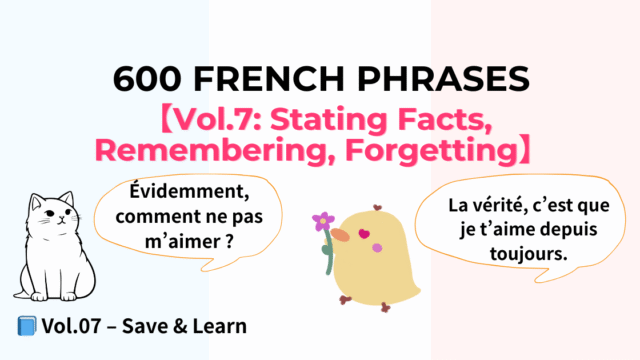600 Useful French Phrases – Vol 5: When Things Don’t Go as Planned(041-050)

This series is for beginner learners ready to reach intermediate level!
Learning a language can feel tough—but let’s keep going, step by step!👟
🗣️ Key Focus of This Volume
As you know, life doesn’t always go according to plan—sometimes for better, sometimes for worse. A bad surprise can lead to something good, and a lucky break can change everything.
In this post, we’ll explore 10 natural French expressions that native speakers actually use when life takes unexpected turns. Whether you’re dealing with something unpleasant, celebrating good luck, or sharing your opinion politely, these phrases will help you express yourself clearly and naturally🌟.
🔟✨ Today’s 10 Key Phrases(041–050)
When Things Don’t Go as Planned: Expressing Frustration, Luck, and Opinions
041. C’est ridicule /That’s ridiculous
📘 Mini Dialogue Practice
A: C’est ridicule, ils pensent que je ne suis pas assez qualifié pour ce poste:
B: Ce n’est pas entièrement faux non plus…
A: That’s ridiculous—they think I’m not qualified enough for this job.
B: Well, it’s not entirely wrong either…
🧠 Grammar & Usage Notes
- ridicule = ridiculous
- qualifié(e) = qualified, skilled
- entièrement = entirely, completely
- faux/fausse = false, wrong
042. À contrecœur/Reluctantly
📘 Mini Dialogue Practice
A: J’ai changé d’appartement, mais à contrecœur, parce qu’il était devenu trop cher.
B: Je suis triste pour toi.
A: I moved apartments, but reluctantly—it had become too expensive.
B: I’m sorry to hear that.
🧠 Grammar & Usage Notes
- à contrecœur = unwillingly, with a heavy heart
- devenir = to become
- trop = too (too much/too expensive etc.)
- être triste pour [quelqu’un] = to feel sorry for someone
043. Par contre, / On the other hand, But
📘 Mini Dialogue Practice
A: Comment était le concert?
B: C’était sympa, mais par contre, le chanteur chantait en play-back.
A: How was the concert?
B: It was nice, but the singer was lip-syncing.
🧠 Grammar & Usage Notes
- sympa = nice, enjoyable (casual)
- par contre = however, but on the other hand
- en play-back = lip-syncing
044. Tu veux la bonne ou la mauvaise nouvelle?/Do you want the good news or the bad news?
📘 Mini Dialogue Practice
A: Tu veux la bonne chance ou la mauvaise nouvelle en premier?
B: Euh…Quelle est la bonne nouvelle.
A: Do you want the good news or the bad news first?
B: Uh… What’s the good news?
🧠 Grammar & Usage Notes
- nouvelle = news (always feminine singular)
- en premier = first
- quel(le) est…? = what is…?
045. J’ai eu de la chance./I got lucky.
📘 Mini Dialogue Practice
A: Tu as réussi à réserver une chambre à l’hôtel pour le week-end prochain ?
B: Oui, j’ai eu de la chance. C’était la dernière chambre de libre.
A: Did you manage to book a hotel room for next weekend?
B: Yeah, I got lucky. It was the last available room.
🧠 Grammar & Usage Notes
- réserver = to book, to reserve
- dernier/dernière = last
- libre = available, free
046. Le hasard a voulu que/ It just so happened that
📘 Mini Dialogue Practice
A: Ça y est! Tu as acheté cette robe!
B: Oui, et en plus, le hasard a voulu qu’elle soit en solde.
A: You got that dress at last!
B: Yes—and it just so happened it was on sale!
🧠 Grammar & Usage Notes
- ça y est ! = finally! done!
- en plus = on top of that / what’s more
- hasard = chance, coincidence
- être en solde = to be on sale
047. Si j’ai de la chance,/ If I’m lucky
📘 Mini Dialogue Practice
A: Si j’ai de la chance, je pourrai prendre trois semaines de vacances cet été.
B: J’espère pour toi!
A: If I’m lucky, I’ll be able to take a 3-week vacation this summer.
B: I hope so for you!
🧠 Grammar & Usage Notes
- si = if
- j’ai de la chance = I’m lucky
- semaine = week
- été = summer
048. Pour moi, / For me, / Personally, I think
📘 Mini Dialogue Practice
A: Pour moi, ce joueur ne mérite pas son salaire.
B: Je suis d’accord avec toi.
A: Personally, I don’t think this player deserves their salary.
B: I agree with you.
🧠 Grammar & Usage Notes
- pour moi = in my opinion / as for me
- joueur/joueuse = player (m/f)
- mériter = to deserve
- salaire = salary, wage
049. À mon avis, / In my opinion,
📘 Mini Dialogue Practice
A: À mon avis, on aurait mieux fait d’aller voir l’autre film.
B: Je ne suis pas d’accord. Ce film était vraiment bien!
A: In my opinion, we should’ve gone to see the other movie.
B: I disagree. I thought this movie was really good!
🧠 Grammar & Usage Notes
- à mon avis = in my opinion
- faire mieux = to do better
- on aurait mieux fait de… = it would’ve been better to…
050. De mon point de vue, / From my point of view
📘 Mini Dialogue Practice
A: De mon point de vue, Montmartre est le quartier le plus agréable de Paris.
B: Moi, je trouve que c’est Saint-Germain-des-Près.
A: From my point of view, Montmartre is the nicest area in Paris.
B: Personally, I think it’s Saint-Germain-des-Prés.
🧠 Grammar & Usage Notes
- de mon point de vue = from my perspective
- quartier = neighborhood
- trouver A (nom) B (adjectif) = to find/consider A to be B
📎 Coming Next
Vol.6 – Phrases No.051–060: How to Express a Guess (Gently & Confidently)
In the next volume, we’ll explore how to express guesses or assumptions—whether you’re unsure or feeling confident. It’s important to clearly separate what you think from what you know—especially in professional and academic settings.
Let’s learn to express your “guess” like a pro!
📝 Note: Some phrases and ideas in this blog series were inspired by the excellent book “フランス語会話フレーズ600” by Romain Bocquillon and Shio Asami. I highly recommend it for learners who want practical and natural French expressions.











Leave a Reply